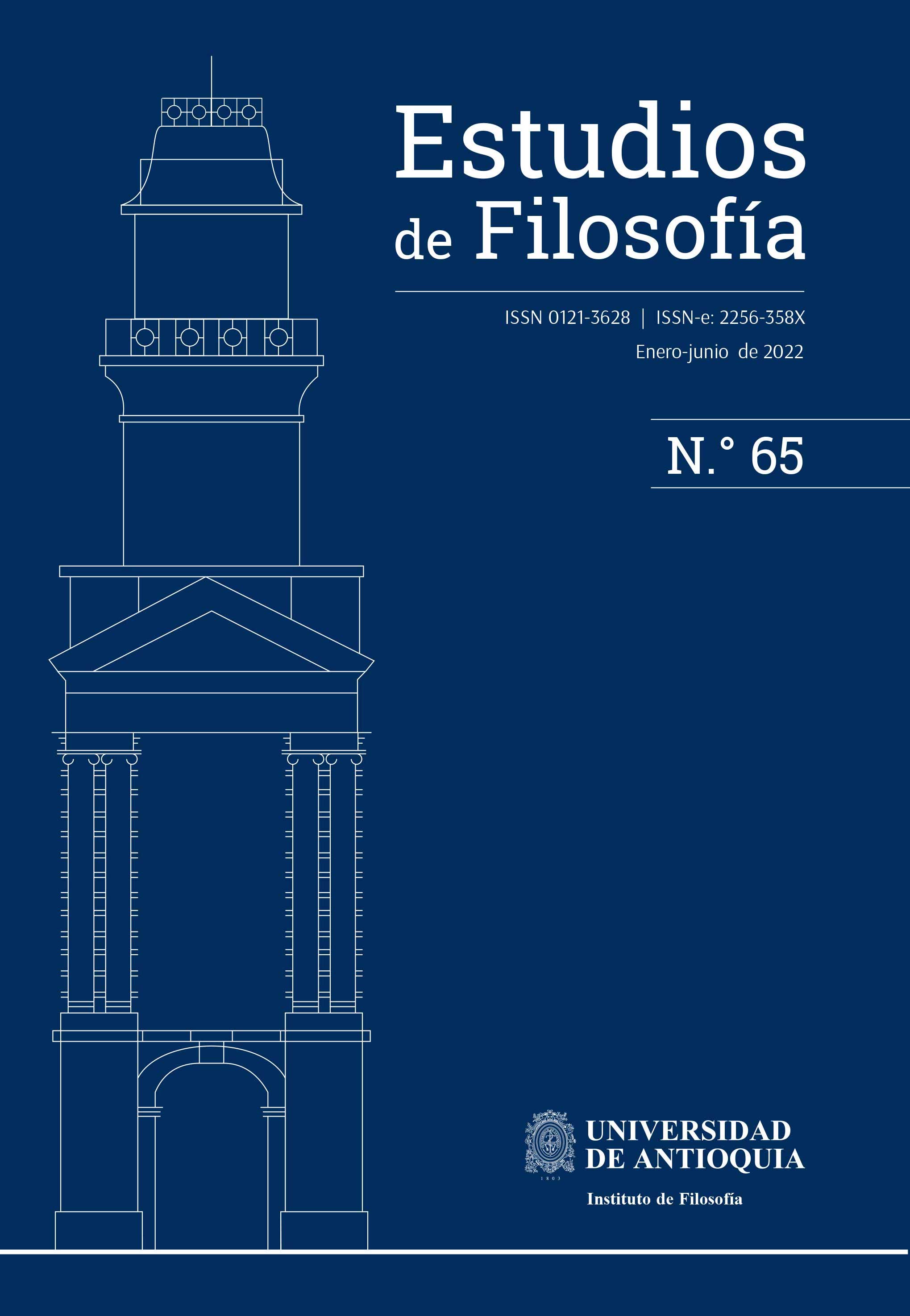Peirce’s open community in light of sentimentalism and normative sciences
DOI:
https://doi.org/10.17533/udea.ef.347278Keywords:
Charles S. Peirce, unlimited community, normative sciences, science, sentimentalismAbstract
Peirce’s idea of an unlimited community has been usually analyzed from its role in science and the normative ideal of truth. However, it is essential to understand the role of the community of inquiry in light of the other normative sciences, aesthetics and ethics, since according to Peirce, any endeavor to know that is not guided by the esthetical ideal of admirable per se should not be considered as proper science, but as a power tool to benefit some elite. This article aims to analyze Peirce’s idea of community of inquiry in light of sentimentalism and the normative sciences in order to evidence that such community is not elitist, but open, insofar as it is also lured by the summum bonum and the admirable per se. Finally, we provide a more organic reading of Peirce’s work, opening the way to consider possible consequences of this position from an ethical and political perspective.
Downloads
References
Acosta-López de Mesa, J. (2019). A semiotic theory of self-control. Cognitio: Revista de filosofía, 20(2), 217-29. https://doi.org/10.23925/2316-5278.2019v20i2p217-229
Anderson, D. R. (2005). Peirce and the art of reasoning. Studies in Philosophy and Education, 24, 277–89. https://doi.org/10.1007/s11217-005-3849-9
Bernstein, R. (1981). Toward a more rational community. In K. Ketner et al. (Eds.). Proceedings of the C.S. Peirce Bicentennial International Congress (pp. 115-120). Texas University Press. http://hdl.handle.net/2346/72487
Colapietro, V. (1989). Peirce’s approach to the self: a semiotic perspective on human subjectivity. State University of New York Press.
Crelier, A. (2007). Los aspectos éticos de la comunidad en Charles S. Peirce. Ideas y Valores, 56(134), 61-76. http://www.scielo.org.co/scielo.php?script=sci_arttext&pid =S0120-00622007000200004
DeMarco, J. P. (1971). Peirce’s concept of community: its development & change. Transactions of the Charles S. Peirce Society, 7(1), 24-36. http://www.jstor.com/stable/40319602
Flórez-Restrepo, J.A. (2018). Fundamentos y consecuencias del falibilismo peirceano. En El pragmaticismo de Peirce: comunidad, realismo y verdad (pp. 127-142). Programa editorial Universidad del Valle.
Haack, S. (1982). Descartes, Peirce and the cognitive community. The Monist, 65(2), 156–81. https://www.jstor.org/stable/27902745
Jacobs, S. (2006). Models of scientific community: Charles Sanders Peirce to Thomas Kuhn. Interdisciplinary Science Reviews, 31(2), 163-73. https://doi. org/10.1179/030801806X103361
Liszka, J. (1978). Community in C.S. Peirce: science as a means and as an end. Transactions of the Charles S. Peirce Society, 14(4), 305–21. https://www.jstor.org/stable/40319853
Liszka, J. (2013). Charles Peirce’s phetoric and the pedagogy of active learning. Educational Philosophy and Theory, 45(7), 781–88. https://doi.org/10.1111/j.1469-5812.2011.00763.x
Mahowald, M. B. (1973). Peirce’s concept of community: another interpretation. Transactions of the Charles S. Peirce Society, 9(3), 175-86. http://www.jstor.com/stable/40319685
Peirce, C. S. (1889/1958). Values in a universe of chance: selected writings of Charles S. Peirce (1834-1914). Philip P. Wiener. Doubleday.
Peirce, C. S. (1992). The essential Peirce: selected philosophical writings. 2 vols. Indiana University Press.
Peirce, C. S. (1994). The collected papers of Charles Sanders Peirce. InteLex Corporation. Reichenbach, H. (1938). Experience and prediction: analysis of the foundations and the structure
of knowledge. The University of Chicago Press.
Savan, D. (1981). Peirce’s semiotic theory of emotion. In Proceedings of the C.S. Peirce Bicentennial International Congress (pp. 319–33). Texas Tech University Press. http://hdl.handle. net/2346/72487
Smith, J. E. (1965). Community and reality. In R. Barnstein (Ed.). Perspectives on Peirce: critical essays on Charles S. Peirce (pp. 92-119). Yale University Press.
Thayer-Bacon, B. (2005). Peirce on education: discussion of Peirce’s definition of a university. Studies in Philosophy and Education, 24, 317–25. https://doi.org/10.1007/s11217-005- 3853-0
Trout, L. (2010). The Politics of Survival. Fordham University Press. https://doi.org/10.5422/ fso/9780823232956.001.0001
Wells, K. (2009). Learning and teaching critical thinking: from a Peircean perspective. Educational Philosophy and Theory, 41(2), 201–18. https://doi.org/10.1111/j.1469-5812.2007.00376.x
Published
How to Cite
Issue
Section
Categories
License
Copyright (c) 2021 Juliana Acosta, Jorge Alejandro Flórez

This work is licensed under a Creative Commons Attribution-NonCommercial-ShareAlike 4.0 International License.
Authors who publish with this journal agree to the following terms:
1. The Author retains copyright in the Work, where the term "Work" shall include all digital objects that may result in subsequent electronic publication or distribution.
2. Upon acceptance of the Work, the author shall grant to the Publisher the right of first publication of the Work.
3. The Author shall grant to the Publisher a nonexclusive perpetual right and license to publish, archive, and make accessible the Work in whole or in part in all forms of media now or hereafter known under a Creative Commons Attribution-NoCommercia-ShareAlike (CC BY-NC-SA 4.0), or its equivalent, which, for the avoidance of doubt, allows others to copy, distribute, and transmit the Work under the following conditions: (a) Attribution: Other users must attribute the Work in the manner specified by the author as indicated on the journal Web site;(b) Noncommercial: Other users (including Publisher) may not use this Work for commercial purposes;
4. The Author is able to enter into separate, additional contractual arrangements for the nonexclusive distribution of the journal's published version of the Work (e.g., post it to an institutional repository or publish it in a book), as long as there is provided in the document an acknowledgement of its initial publication in this journal;
5. Authors are permitted, and Estudios de Filosofía promotes, to post online the preprint manuscript of the Work in institutional repositories or on their Websites prior to and during the submission process, as it can lead to productive exchanges, as well as earlier and greater citation of published work (see The Effect of Open Access). Any such posting made before acceptance and publication of the Work is expected be updated upon publication to include a reference to the Estudios de Filosofía's assigned URL to the Article and its final published version in Estudios de Filosofía.















